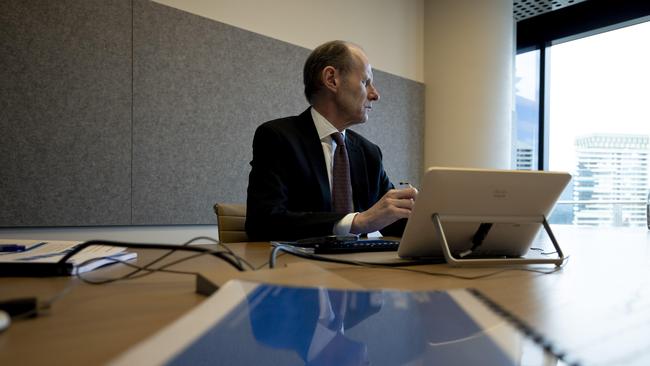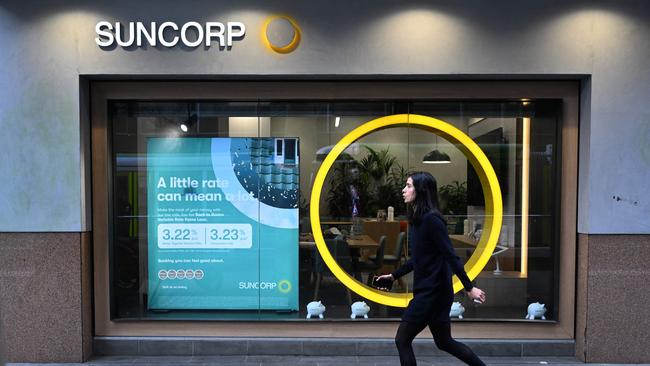ANZ boss Shayne Elliott says market misconduct accusation different to past scandals
Outgoing CEO Shayne Elliott says the latest alleged incident of market misconduct has nothing to do with previous scandals under his lengthy watch.

Outgoing ANZ boss Shayne Elliott says the investigation into the bank’s markets business does not represent lessons ignored from past crises.
Ruling off his final financial result as chief executive, Mr Elliott said the alleged market misconduct, centring around claims its traders rigged a $14bn government bond deal, had nothing to do with another trading scandal under his watch nearly a decade ago.
As ANZ lobbed a $3.56bn cash profit for the six months to March 31 on Thursday, edging out analyst’s expectations, Mr Elliott said the bank’s earlier run-in with the Australian Securities & Investments Commission over claims its traders had rigged the Bank Bill Swap Rate had little to do with the intrigue surrounding ANZ’s bond desk today.
Rather, Mr Elliott said community standards had changed in the wake of the 2016 scandal, which saw ANZ settle with ASIC over claims it manipulated the swap rate.
“If you want to point anything at me, I’m happy to take the hit for that, some of those changes we haven’t always kept up with,” Mr Elliott said.
“We got caught short on non-financial risk, I don’t think it’s about not learning the lessons of the past.”
The CEO said he knew all of the details of the alleged market misconduct issue now under investigation by ASIC, and revealed last year, where the corporate regulator is probing whether ANZ traded ahead of a massive bond deal to the benefit the bank and at the expense of the taxpayer.
Several traders have been forced out of ANZ in the wake of the scandal.
Mr Elliott knows “what we did” and “what happened recently in markets” which was “not the same” as the BBSW scandal.
“I think there will always be lessons from the past,” said Mr Elliott, who has been running the bank since 2016. The 44 occasions ANZ’s traders allegedly manipulated BBSW took place from 2010 to 2012, at the same time as Mr Elliott ran ANZ’s Institutional division.
The Australian Prudential Regulation Authority recently slapped ANZ with a $250m capital penalty, topping up an existing $750m overlay, warning the bank had failed to control non-financial risks.
The markets division was also subject to a review by consultant Oliver Wyman, with Mr Elliott noting the findings were being rolled into the bank’s broader work around non-financial risk which largely refers to culture.

The ANZ CEO’s exit comes as the bank’s board brought forward his replacement by successor and former HSBC banker Nuno Matos, with the Portuguese executive set to take the top job on Monday.
Mr Elliott last earnings were bolstered by his $4.9bn acquisition of rival lender Suncorp Bank.
Without Suncorp Bank’s contribution, ANZ would have reported an 8 per cent profit slump to $3.28bn, instead coming in flat against the first half of last year.
The markets business delivered $342m in cash earnings for the period, down from the $442m posted last year.
Overall, the institutional bank delivered $1.3bn in earnings, down 9 per cent on last year’s interim result.
The institutional bank also achieved deposits and lending up 4 per cent over the March half.
The retail business earnings slumped 11 per cent, to $705m.
This is despite home lending lifting 3 per cent in the period, while customer deposits grew by 4 per cent.
Suncorp Bank was resigned to a more muted result, with loans up only 1 per cent and deposits rising 2 per cent.
The bolt-on banking business reported $286m in earnings.
Although ANZ benefited from the rising tide of Australia’s housing market, Mr Elliott was concerned no government had managed to tackle the ballooning cost of property.
The ANZ boss also pointed the finger at APRA, questioning whether “well-meaning policy” was making the problem of housing affordability worse.
“It’s a big, complex problem, I don’t envy people who have to deal with it,” he said.
“What I worry about is through well-meaning regulation and an intent to protect everybody from harm what we have done is created a great shadow financial system out there which is not as well regulated whether that’s private credit, payday lenders, consumer finance or buy now pay later.”

ANZ also reported growth in both lending and deposits for its commercial bank, which delivered $655m in earnings. Its New Zealand operation booked moderate growth in deposits and lending, with profit flat on last year.
Millford portfolio manager Anthony Ip said ANZ’s results “highlights some of the margin pressures the major banks are facing from both the asset and funding sides of the balance sheet”.
Mr Elliott said Australia’s households remained “robust and resilient” noting while interest rate relief was welcomed, many of the bank’s customers already had “strong balance sheets”.
Reflecting on his time in charge, Mr Elliott said ANZ was now a “simpler, stronger and better bank” than the financial institution he inherited almost 10 years ago.
He noted ANZ had sold off almost 30 businesses since he started.
“I’m very happy to say we need to be boring and safe, and I sleep better at night knowing that,” he said.
ANZ declared a flat 83c interim dividend, meeting expectations, 70 per cent franked.
The bank also moved to extend a $2bn buyback for a further 12 months, after snapping up just $1.2bn of its total allocated target.
However, the bank warned it would “adopt slightly more conservative capital settings” ahead, warning this would influence “the pace of the remaining buyback”.
ANZ shares closed down 1.9 per cent to $29.40.






To join the conversation, please log in. Don't have an account? Register
Join the conversation, you are commenting as Logout